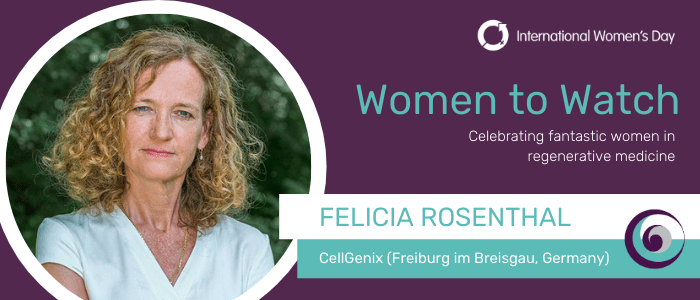Women to Watch: enabling safe and efficient production of cell and gene therapies with Felicia Rosenthal

As part of our ‘Women to Watch’ series on RegMedNet, we’re putting Felicia Rosenthal into the spotlight. Felicia is the CEO and Co-founder of CellGenix (Freiburg im Breisgau, Germany) and is an MD by training, with an MBA degree from Kellogg-WHU (Vallendar, Germany).
Felicia began her translational medicine career in the early 90s in Bernd Gansbacher’s lab at Memorial Sloan Kettering Cancer Center (NY, USA), running the first clinical studies of gene-modified tumor cells as an immunotherapy product. She returned to Germany and launched CellGenix with Roland Mertelsmann, Head of Department in Hematology/Oncology at the University Clinic Freiburg (Germany) in 1994.
Can you provide us with an overview of what your work involves?
My main task as CEO is to plan and communicate our company strategy and short-term goals. To reach these goals and enable company growth, I need to secure and optimally allocate our assets, capital funds, infrastructure and resources. In addition to this, I supervise and control the implementation and achievement of our company goals. Since I cannot do this without a strong team supporting me, I am also personally involved in selecting the right key personnel and to motivate and coach them.
What are the best aspects of your job? What are the most challenging parts?
For me the best part of my job is being able to combine my medical and scientific background with entrepreneurship. I love working in an ever-changing work environment and the dynamic and fast-growing cell and gene therapy market. This allows me to continue learning each day I am at work. I feel blessed that with our products we contribute to enabling and accelerating safe and efficient production of cell and gene therapies for the benefit of patients. I have the pleasure to work with a great team of colleagues and co-workers in an inspiring atmosphere, and I greatly enjoy the personal interaction and professional exchange with my colleagues globally.
In the last years we have been successfully growing our business. This is the result of a long-term strategy, an arduous journey and strong commitment of our managers and employees. We are continuing to invest a lot in the expansion of our infrastructure and growth of our teams in almost all functions. It is a challenge to lead and make this transition from a smaller, more familiar working environment to a larger enterprise. It is always easier when all goes well – but when you encounter difficulties and experience drawbacks you must continue to be optimistic and resilient.
Have you ever in your career felt to date that you were at a disadvantage owing to your gender?
No, I was fortunate that throughout my career I encountered leaders and worked for people who valued my qualifications, my strengths and my personality.
Did you notice any difference in opportunities available to women, or in how you were treated, as you gained more senior positions over your career?
Personally, I did not experience different treatment over my career. I believe, however, that the opportunities and jobs ‘accessible’ for women get less in more senior, higher positions. This could partially be explained by sociodemographic criteria such as age, qualification, professional experience or part-time occupation that might still disfavor women. On the other hand, men’s networks tend to be larger and broader, thereby providing more career opportunities.
In your opinion, what more could be done to promote gender equality in your field?
To allow more women in management and senior positions, society must continue to rethink the role of women in society. I think to promote gender equality there should be a more equal division of parental tasks between men and women. In corporations a cultural change is needed to accept a more equal distribution of parental leave. A better framework and offering of childcare are needed to make it possible for both parents to work. Companies on the other hand can offer more flexible employment models with part-time offers, ‘return-to-work’ models after parental leave, and mobile office opportunities.
Lastly, who is your female superhero?
I do not have one single female (nor male) superhero. There are two great female personalities of the last century who I admire. M Curie – the first female scientist to receive the Nobel Prize and the only one to receive two, and Simone de Beauvoir as one of the most prominent French writers and philosophers and a feminist.
Acknowledgements
This interview was put together and conducted by our Senior Editor, Sharon Salt, with written responses provided to us by CellGenix.
Disclaimer
The opinions expressed in this interview are those of the interviewee and do not necessarily reflect the views of RegMedNet or Future Science Group.
You might also like:





